12 Music Reviews
The Antiques, Nicknames and Natives (Banter Records)
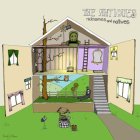
There's a rustic, weekend in the country vibe to Nicknames and Natives, like the Band or The Notorious Byrd Brothers. It's country-ish, heavy on the "ish", with more of a pure-pop (light/bright vocals, and emphasis on melody) approach, yet with a bluesy rock crunch, especially near the beginning. That makes it often in the vein of the first Wilco album, but there's also some beautiful fragile ballads, like the Simon & Garfunkel-esque "Prolonged Detour." There's a persistent theme of lost lovers trying to find each other, and themselves, and the lyrics are filled with some fairly clever, philosophical turns-of-phrase. (Though my favorite line only appears in the lyric printed in the liner notes, it isn't sung: "Well he loved her very much / but in a bad way / like the appetites of Houston / way too much.") The first song has this memorable line: "So you bring a Spanish map / and bring a deck of full, unbroken hearts / cause it'll tell you where you've been / but it'll fail to tell you where you are." That sums up the feeling of much of the album, its characters lost. Yet when those lines are echoed again at the album's end, its in a different, more hopeful context. The ending note is struck by "Near Yorktown and at the X", which carries the hope for an idyllic, paradise of a future for the album's waylaid would-be star-crossed lovers. – dave heaton
The Capstan Shafts, The Megafauna Undermined (Slight)
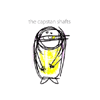
If a new Capstan Shafts recording comes out, and I don't comment on it, don't take that as me growing bored with Dean Wells' steady output of homemade rock. It's just hard to keep up sometimes. This latest album, The Megafauna Undermined, has been out for a while now, and it's one of his best. At first listen it follows the general direction his releases seem to be going lately: towards a cleaner, fuller, varied style of pop/rock (more rustic in some ways), that at the same time is even more directly hooky/catchy. And again short songs, creative song titles ("Sincere as a Windchime," "Handstander in an Age of Backflips," "My Family Was Welsh. I'm Just Tired"), and lyrics containing both cynical joking and romantic visions. But actually in some ways it seems less like a continuation of what he's been up to than a refinement of the basic fast-and-loose Capstan Shafts style, like some of those earliest EPs all grown up. There's a hopefulness to a lot of these songs, more so than some of the recent recordings – and he immediately channels that bright feeling into generating the rush of a quick slam of rock guitars with a fantastic pop melody. The opening trio of "More Lovely Than Likely," "Big Oil Hackery" and "Save My Down for a Sadder Day" (note that song title) quickly sets up the style for the album: quick, punchy, unbelievably catchy. Messy guitars sound perfect, when played loud in service of a great singalong hook. The Capstan Shafts take a feeling and a tune, play them for us like a rough draft version, and then move on to the next. And it's both exciting and rewarding, start to finish. As the final song title puts it: "Hit Me Like the Greatest Car Song," though of course that track doesn't match the title at all. Some of these songs are just plain pretty, at the same time ragged and strange (which is the best way to go about being pretty). One of my favorite moments it the back-and-forth in "The Worst Lssons From the Wrong People," which starts "you're sucking corporate ass and then you want to kiss me now / but I don't want to kiss you now" and then cycles between "Yes I want to" and "No I don't" sentiments. I also love that there's a 55-second song snarkily titled "The Complete History of England." There's a moment in "Sincere as a Windchime" where there's a sonic shift followed by an emotional one: "I don't look forward to the new blessed days." Wells can conjure up sadness and happiness, but the latter is more like a feeling that things might be all right for a little while. There's some battle going on here between doubt and contentment, between fear and pleasure. In any case, it's all good…The Megafauna Undermined has better tunes and more interesting lyrics than the last 10 albums you've listened to, at least. – dave heaton
The Channel, Tales From the Two-Hill Heart / Sibyllane Machine (C-Side)
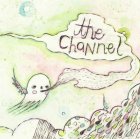
Lovelorn country rock/pop (think Silver Jews, Pavement, Son Volt, Byrds) is the way with the latest from the Channel, at least on the first disc of this set. It's intoxicating music, if not earth-shattering, but with a ghostliness to it, one evoking memory and the presence of loss. As a line on "The Man I Don't Remember" puts it, roughly halfway through this disc, "She used to treat me like a man I don't remember / and now I wonder who I am." That same story is surreally turned into a fable on the very next track. Call it amnesiac clever-country-rock, but don't forget about the occasional southern rock leanings or the beach harmonies. The dust of the Old West and the ghosts of the desert are parts of the atmosphere, and they're entwined with the memories of the people we've loved who left us. Tales… ends with a feeling of moving on, but with trepidation. But that isn't the end at all, actually, as there's a whole different album on disc 2: Sibyllane Machine. This one's an underwater adventure: more escapist, and more rock. It can be rollicking, fiery, psychedelic, but still very melodic. There's a spirit of fun, of letting down their hair creatively speaking, and it ends on a nice twin note of sweetness and mystery. – dave heaton
Doleful Lions, Song Cyclops Volume Two (Parasol)
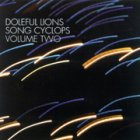
This Doleful Lions epic opens with a doo-wop "prayer" and then launches into a fuzzy, super-catchy pop-rock song with medieval fantasy overtones. That's the way here, shifting around from influence to influence, coming up with something grand. Jonathan Scott leads the Lions' lo-fi pop/rock through all sorts of musical styles, forming it all into satisfying, catchy music built around the ancient skill of harmony, and of writing a great tune and singing it. Or not even writing it, necessarily, as they lend their touch to a batch of covers as well, everything from the Close Lobsters to Glenn Danzig to the Beach Boys. That gives a sense of the scope of Scott's taste; that scope shines through even within the general demeanor of lo-fi, direct pop/rock songwriting. – dave heaton
Duke Fame, Too Proud to Practice (Geeves)
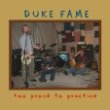
On their first album, the North Carolina-baed Duke Fame struck me as the sort idea version of the sort of pop/rock band you might encounter in an everyday-life setting. That is, I imagined coming across them at a house party, at an outdoor fair, or at a neighborhood bar, and being inspired by both the quality of their music and their obvious love for how great melodies sound backed by loud instruments. This album, as the joking, Replacements-esque title Too Proud to Practice might indicate, is louder than before. It has more of a ragged rock sound, and that's fine by me. There's traces of punk ("Patterns"), of Superchunk ("Hong Kong Rob"), of Guided by Voices (or a song in tribute to them at least, "All Hail the Monument Club"). There's also, maybe even mostly, straight-up power-pop. And there's a ballad, even ("Memory Bucket"). This is quick, fun, catchy music. Some of the songs are more distinctive than others, but all are played with spirit, sincerity, and an obvious appreciation for the role music plays in people's lives, the way a song can lift you up or ease the pain. – dave heaton
Freescha, Head Warlock Double Stare (Attack Nine)
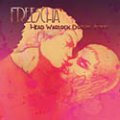
There's a horror movie vibe to Freescha's Head Warlock Double Stare. But it's also bright, colorful music. It's awash in synthesizers yet still spooky, with empty corridors all over. It's warped, minor-key electronic pop, completely in its own category. And 24 tracks of it: an epic. The track "Phantom, Strike the Disco Down" sounds as if Freescha has invented a future version of old-fashioned silent-movie theme music…and the more I think about it, the more that feels like an apt description of this whole project. Think grand old spooky mansions built of dust and devils, but also think color and light and stylish night-club action. Then again, this music is too diverse to be pinned down to one colorful description – "Nothing to Say But Magic" even reminds me of Billy Joel, of all things. – dave heaton
Darren Hanlon, Fingertips and Mountaintops (Candle)
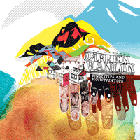
The songs Darren Hanlon writes and sings are populist: people- and place-oriented, and driven by attractive melodies and, increasingly, arrangements. They also have a personal stamp, like we're hearing one person's take on life, both humorous (a previous album had the song "There's Not Enough Songs About Squash") and poetic. Poetic in an everyday life, universal way – witness even just the lyric on the album: "One thing about all this clock punching / brings back meaning to the weekend." Fingertips and Mountaintops is another shining example of his talents; it's musically more refined than ever, and with songs that are incredible rewarding, transcendent even. There's themes throughout of movement, of finding your place (from the stately bird-and-people-pondering "The People Who Wave at Trains" to a playful tale of crashing at friends' apartments titled "Couch Surfing"), and of the complexities of love and happiness. Love's a common theme, but never in a clichéd way, and never in a way that suggests that life holds easy answers. Hanlon sings and plays softly and sensitively, but also has a matter-of-fact, down-to-earth directness about him. He's not going to offer you any fluff, not going to act like life's a cloud of perfection, yet his songs are hopeful, too, in a real-life way. – dave heaton
I'm From Barcelona, Let Me Introduce My Friends (EMI)
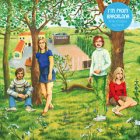
One of the most infectious songs of 2006 was "We're From Barcelona," by I'm From Barcelona. There's 29 people in the group, and on this song you can hear them, as they sing a proud chorus with a great "na na na" tune matching a melody played by a trumpet. There's a fantastic melody, and a feeling of absolute joy, with lyrics like "We'll bring you love / you'll be one of us when the night comes." In fact, this feeling of joy, and an accompanying feeling of the freedom and curiosity of childhood, are the mark of the band…more so than the 29-memmber sound, since actually there's only a few songs where it sounds like there's more than a few people. While the group clearly values the notion of community, there's definitely one auteur behind the group: Emmanual Lundgren, who wrote all the lyrics and music, and also produced, recorded and mixed the album. Those feelings of freedom and joy carry through songs about pretending it's Sunday and sleeping in, abut stamp-collecting and traveling, about dreaming, about escaping into a treehouse. Of course, increasingly you feel that there's pain behind this desire to escape, pain that's turned into hope through song. "This Day" contains the pressures of society; "Chicken Pox" has heartbreak; "The Saddest Lullaby" is indeed sad. On "Ola Kala" they sing "don't be afraid / cause everything is gonna turn to be OK," and you get the sense throughout that they trust their melodies enough to make this true, to believe, as cheesy as it may sound, that if we all sing together, things will be OK. – dave heaton
Momus, Ocky Milk (American Patchwork)

Have critics been writing about hos innovative this album is, and I just missed their articles? I hope so. Momus has been around long enough that might be taken for granted (I guess), but his art is always evolving, and this is the latest step forward. His interest in future rhythms/sounds, and in Asian and old European song forms/theatrical forms, have synthesized into this unique new (even for him) style, one helped along, as on previous albums, by the electronic retexturing of collaborator John Talaga. This music is particularly soft (in a grand way), busy (in a sensuous, not chaotic way), and mysterious (pleasantly so). As an audio design piece it's gorgeous, marked both by some many aesthetics under this new one, from the '80s (Pet Shop Boys especially; listen to "The Birdcatcher") to absolute soft-pop balladry ("Nervous Heartbeat") to Morriconne-esque atmosphere, but spooky and haunted ("Devil Mask, Buddha Mind", "7000 BC"). The album gets increasingly vague, open-ended and strange, starting about half-way through. "Count Ossie in China" has a remarkable raspy rap, like a rastaman caveman lost in space. "I Refuse to Die" is a showtune/lost folk song about immortality. The album as a whole feels both prehistoric and intergalactic, in a way that's incredibly exciting and mind-expanding. – dave heaton
Summer Hymns, Backward Masks (Misra)

It's been a while since I've thought about Summer Hymns – Goergian Zachary Gresham's band that once upon a time would have been mentioned with the "Elephant 6" tag. But this album, their first in a few years, gives ample reasons to keep them at the front of my brain. It's an album with a unique vision: dreamy, relaxed, with a Southernness that's there but not over-pronounced, and a '60s-ish melodic quality that's the same. There's a romantic haze, but not an easy one – a variety of feelings are there, loneliness and anger and uncertainty as much as dreamy-eyed infatuation. Love, and the pursuit of it, are not simple, yet constant. It's a cohesive album of one mood, where you step into the album and immediately encounter it – so much so that it almost gets repetitive, but also feels comforting. At the same time, they favor melodies and songwriting over mood, a major achievement within such a dominant atmosphere. The songs are both soft and rugged, taking us inside a dreamer's mind, and also carry surprising little touches, like with the sneaky/funky quiet instrumental "Limousine." They're songs about fear, and about chasing fear away – and they succeed at it. A remarkable album. – dave heaton
Solyoni, The Princess Market (Velvet Fallopian Tube)
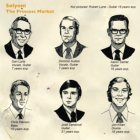
This album's first two songs present Solyoni as the band on stage in a modern-day version of a John Hughes high-school dance scene. They're sweet songs to swoon too, great pop tunes but also appropriately snarky and rough. It's that roughness that spreads as the album proceeds. (I'm tempted to say, "spreads like a disease," but that's too harsh", as the darker edge is mostly nice.) The next songs retain the sweetheart crush themes while going towards a drunk-country-rock approach, one that keeps growing in strength. By track 6, "Kicked in the Head by a Horse," they're off on a blues-guitar, slow-motion-Crazy Horse trip. Most of the time they find a killer middle ground between dressed-up sweetness and on-a-bender spontaneity and sloppiness. It's prom night in a trash heap, and I like it. Guitars sketch outlines of clouds of noise around the pop songs. "Parachute" has a ragged singalong at the end that's nasty and glorious. "Beard of Bees" starts with an off-kilter doo-wop/slow dance and with lyrics as surreal as the title indicates. "Nesting Doll" has a guitar solo that's basically the melody for "Dancing With Myself," a funny touch. The closer "Pink Cotton Dress" is like a Cinderella fairy tale and the simultaneous destructions of one. This 8-member Seattle (via Ohio) group creates dreams, and rips them up. – dave heaton
The Trolleyvox, The Karaoke Meltdown (Transit of Venus)
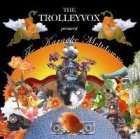
The Philadelphia band The Trolleyvox play pop music going for the mythology of rock. Led by multi-instrumentalist/songwriter Andrew Chalfen and featuring Beth Filla on lead vocals, the group is thinking and acting big even when it doesn't seem likely. They pick up an arena-rock style (the Who, GBV) even though their singer has a presence closer to Natalie Merchant. The album carries a big-concept attitude in its design (the way it's titled "The Trolleyvox Present the Karaoke Meltdowns", as if it's a Broadway show or a rock opera),yet the songs themselves are quite small, with the basic focus on humble pop melodies and first-person observations about the world. That's an interesting juxtaposition between the big and the small, whether it's purposeful or not. The songs themselves are sometimes memorable and attractive, sometimes forgettable and more plain, but there is something nice about music aiming big and small (for the stars and the heart) at the same time. – dave heaton
Copyright (c) 2006 erasing clouds |
|